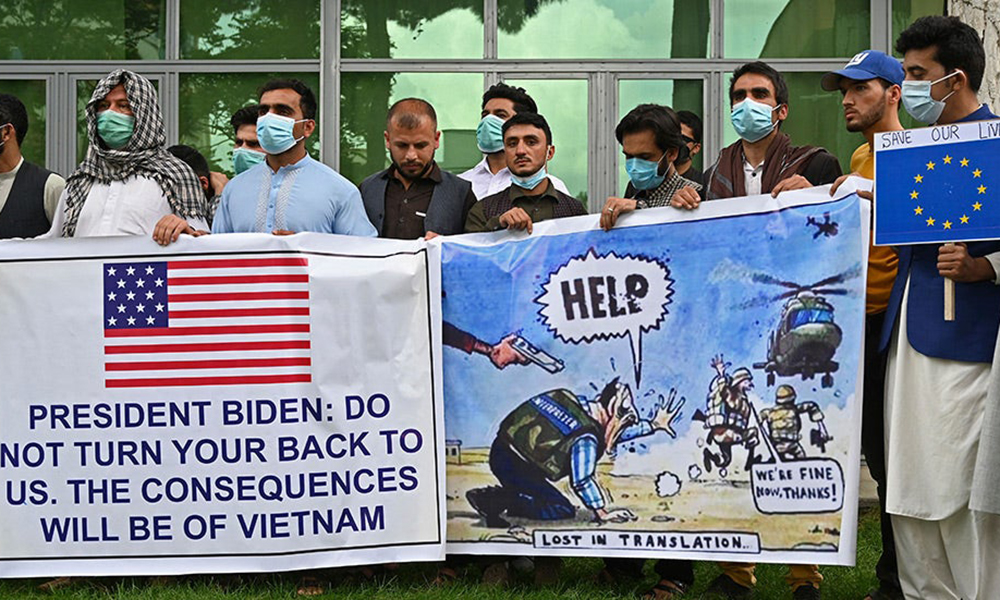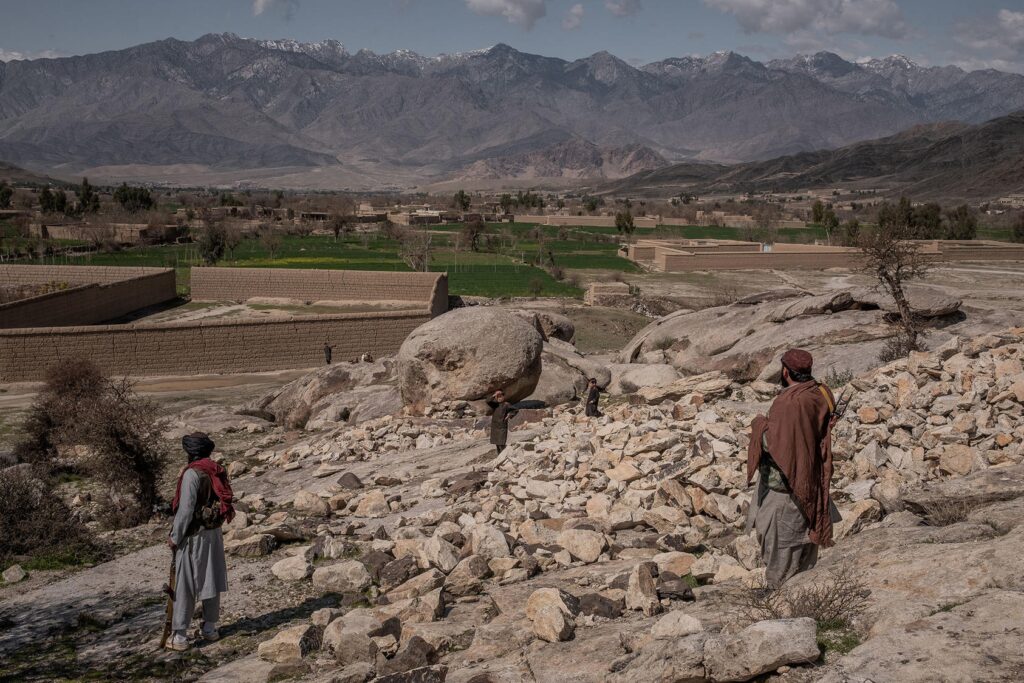Let’s stop all the hand wringing and angst over Afghanistan. Now. It’s fooling no one. America, Britain and their NATO allies have had 20 years to help put the country back on its feet, deliver human rights, female equality and a democratic government free of corruption. They’ve failed.
Despite the return of major charities back in 2002 and billions of dollars later, women’s rights have barely improved beyond Kabul. The capital is the seat of arguably the most corrupt government in the world unable to progress because greedy politicians are more concerned about lining their own pockets than good governance and development.
Little wonder then that the Taliban is making huge inroads to regain control across the country, and at such a rapid pace that it is leaving many military strategists breathless. In some provinces, it is being welcomed back and meeting no resistance. The movement now controls more than half of Afghanistan.
Of course this leaves Western governments and their compliant media in an awkward position after 20 years of demonising the Taliban. We were told daily after the horrific events of 9/11 that it ran the most brutal, ruthless regime in the world. But there was no Taliban involvement in 9/11. That was a narrative pushed out by the then US President George W Bush and his willing sidekick, British Prime Minister Tony Blair.
They talked about girls’ schools being closed and children banned from flying kites. As is often the case in such scare stories there was a grain of truth in their words. However, if journalists had investigated further they would have discovered that schools were abandoned and closed for everyone because there was no money, part of the country was in the grip of famine and all of it was suffering from the after-effects of a devastating civil war.
Kite flying was indeed banned in major towns and cities, because the razor-thin wires were slicing into and through overhead power cables, killing the unfortunate kite flyer and leaving major areas without electricity. Imagine trying to fly a kite in London’s Oxford Street and you can see why such a practice was stopped.
When I went back to Afghanistan in February 2002, the year after my capture by the Taliban much was made by the media that Kabul University was re-opening its gates after the movement’s fall and that girls would be able to return to school. Many believed that the war was all but over and the future looked bright. Indeed it did, but when I asked at a press conference how more girls than boys had passed the entrance exam if girls weren’t educated under the Taliban, there was a stony silence.
Instead of a response, I was undermined, sidelined and silenced; written off as a victim of Stockholm syndrome simply because I’d survived a terrifying ordeal when I’d been captured and held by the Taliban for ten days in the previous September. Far from being compliant or bonding with my captors, however, I was the prisoner from hell. In fact, I’m not sure who was happiest to see me return safely to Britain, the Taliban, or me.
“She is a very bad woman with a very bad mouth,” said Mullah Abdul Salam Zaeef during a press conference announcing my release from captivity. I did not like the Taliban and they certainly did not like me. However, as a journalist, I’ve always felt it my duty to deliver the truth and the truth is that my jailers treated me with kindness and respect that I had not expected. Furthermore, I could see that they loved their country and would never give up the struggle to take it back from the US-led invaders.
Like it or loathe it, the Taliban has neither wavered from its goals nor pursued any hidden agenda. We in the West might not like its way of thinking, ideology, or beliefs, and would baulk at the very idea of introducing Taliban ways into our countries, and with good reason. But why on earth should we expect the movement and its supporters to adopt and embrace our cultures, habits and beliefs which they find equally unpalatable?
As I write this, the US — which was supposed to have withdrawn its forces from Afghanistan earlier this month — is bombing Taliban positions. Enough is enough. The time has come for the West to take a giant step back and stop interfering in Afghanistan other than to provide no-strings humanitarian aid and support to make up for 20 years of devastation. If the Afghan people want to get rid of the government imposed on them by the US, then that’s their business, not ours.
Yes, people are still dying in this conflict, as they have been for the past 20 years. It’s only now, though, that the number of civilian casualties reported in the Western media are deemed to be important. When I left Afghanistan after being released by the Taliban in October 2001 the war had already begun. During the journey from Kabul to the Pakistan border, I saw what looked like strong evidence that civilian areas had been bombed by the US-led coalition, including hospitals. Nobody was interested in the number of Afghan civilian casualties back then.
I often refer in my columns to the hypocrisy and double standards deployed by the West and some of my colleagues in the media. Never has it been more blatant than in their coverage of Western interference in Afghanistan.
Like it or not the Taliban is coming back to power. I know from my own contacts within the movement that the preferred option is a diplomatic settlement, but there’s little trust between the leadership and the government of President Ashraf Ghani. The truth is that he could have reached a peaceful settlement with the Taliban months ago, but he always thought that the US would be there to back him, so it wasn’t necessary to do so.
He clearly hasn’t been paying attention. The list of dictators and leaders who’ve been installed by the West over the years is long, as is the list of those who have been betrayed by their fickle friends in Washington and Europe. Presidents Saddam Hussein (Iraq, 1979-2003) Colonel Muammar Gaddafi (Libya, 1969-2011) and Zine El Abidine Ben Ali (Tunisia, 1987-2011) are three who spring to mind. All were at one time supported by the West. They would confirm what I say if they had lived to tell the tale.
Ghani would be wise to cut a deal with the Taliban in the next few days before it is too late. He can no longer rely on his own Afghan security forces who he expects to fight without pay, such as the extent of the corruption in his government. The US set aside billions of dollars to prop up the Afghan military but the money has never reached the soldiers on the ground. Little wonder, then, that the troops have lost momentum in recent weeks, with some fleeing for their lives and others joining the Taliban. Fighting for your country is one thing, but putting your life on the line to keep the people who are pocketing your hard-earned wages in power is something else.
Afghanistan is a classic example of what happens when Western intervention goes wrong. Nevertheless, instead of sitting back and agreeing, it is time for other foreign players to step into the breach for the sake of the Afghan people. Qatar has played a crucial and positive role. In February last year, the US and the Taliban were in the capital Doha when they signed the Agreement for Bringing Peace to Afghanistan. Another equally trusted Muslim regional power is Turkey, which has already prevented the massacre of civilians in war-torn Libya and Syria.
Turkey is taking over security at Kabul International Airport after the withdrawal of US troops. Observers say that this is key to maintaining stability. Importantly for the Taliban, positive help from Muslim countries towards a political solution to end the war would be welcome. Istanbul may well host an Afghan peace conference in the coming months.
If so, it could set a precedent for other troubled Muslim lands, including Libya, Syria, and Yemen, for example. Or even Western Sahara, Morocco, and Algeria. At the very least, though, the West should keep out. Its track record is appalling, and it needs to learn from history. Afghanistan is not known as the “graveyard of empires” for nothing.







